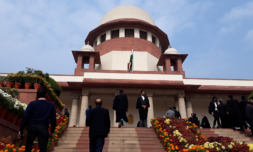On January 18th, The Ministry of Education issued guidelines to hold coaching centers accountable to tackle the alarming rise in cases of student suicides across the country.
The Indian central government has finally stepped up to regulate the vast, unruly coaching center industry following yet another tragic year of student suicides linked to intense academic pressure.
The Ministry of Education published new guidelines this month intended to relieve some of the relentless stress placed on young students while also cracking down on unscrupulous centers focused solely on profits over student well-being.
‘The number of unregulated private coaching centers in the country continues to grow in the absence of any laid down policy or regulation.
‘Instances of such centers charging exorbitant fees from students, undue stress on students resulting in students committing suicides, loss of precious lives due to fire and other accidents, and many other malpractices being adopted by these centres are widely reported in the media,’ the Education Ministry said.
Key provisions bring needed oversight
The new rules will impose standards for the first time on a sector that has operated outside the law despite enrolling millions of students each year.
According to the guidelines, centers cannot accept students younger than 16 years old, typically before 10th standard exam, in order to reduce pressure on children. Industry data estimates about 40% of current students are under 16.
Coaching centers can no longer make lofty promises about rank and exam scores they cannot guarantee in order to lure students. Teachers must have a college degree, and centers cannot hire those convicted of serious crimes. Currently, there are no such standards.
Centers will be obligated to charge ‘reasonable’ fees and issue refunds within 10 days if a student withdraws from a course. Both moves prevent families from losing money to unethical operators.
In adherence to the outlined directives, tuition fees for various courses must be deemed fair and reasonable, with transparent provision of receipts. In cases where a student, having paid the entire course fee, withdraws mid-term, a pro-rata refund for the remaining period is mandated within 10 days.
This refund policy extends to hostel fees and mess charges for students residing in coaching center accommodations. The stipulation firmly prohibits any arbitrary fee increases during the course duration.
To fortify this policy, the government proposes imposing penalties of up to ₹1 lakh or even canceling the registration of coaching centers found guilty of charging exorbitant fees.
All centers must employ counselors and have procedures to identify and help students suffering from mental health issues. This attempts to address root causes of academic pressure on vulnerable youth.
As per the recent guidelines, acknowledging the intense competition and academic stress faced by students, coaching centers are advised to prioritize students’ mental well-being. They are encouraged to conduct classes without imposing undue pressure and establish an immediate intervention mechanism for students in distress.
The guidelines emphasize the creation of a counseling system easily accessible to students and parents. Providing information about psychologists, counselors, and their availability is recommended.
Furthermore, coaching centers are urged to appoint trained counselors to offer effective guidance and support to both students and parents. These tutors are suggested to undergo training in mental health issues.




















